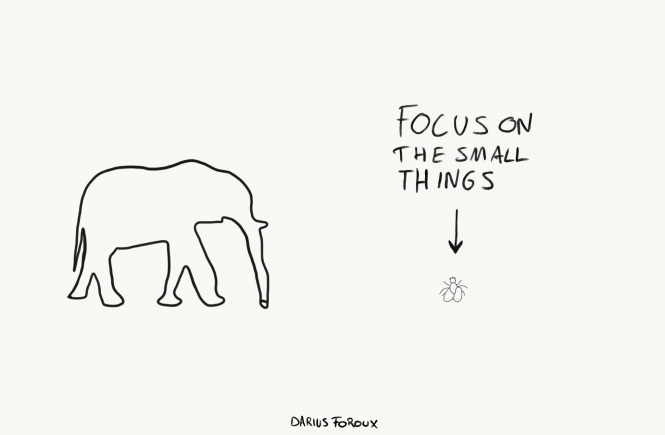One of my readers recently replied this to one of my weekly newsletter emails:
“How are you so positive?”
I thought to myself, “Haven’t I written about this before?” I went through all my articles and the answer is no. I have written about the importance of having a positive mindset a lot.
But after 6 years of blogging, this was the first time I got that question. And it’s so on point. Sometimes we take things for granted. Even though I’ve experienced many challenges in life (like almost every other human being), I never gave up my positive mindset.
Often, we look at the world and consider it negative. That’s not a surprise. Because taking one glance at a news website will make the steadiest person depressed. It happens to me too. But calling the world negative is a misjudgment.
That will only cause frustration. The Stoic philosopher Epictetus made that evident in his teachings, two thousand years ago (quote is from The Good Life Handbook):
“So when we are frustrated, angry or unhappy, let’s hold ourselves responsible for these emotions because they are the result of our judgments.”
The Stoic perspective is all about being objective in your perceptions. When your thoughts become negative “because” of something, you’re making misjudgments. Epictetus continues:
“No one else is responsible for them. When you blame others for your negative feelings, you are being ignorant. When you blame yourself for your negative feelings, you are making progress. You are being wise when you stop blaming yourself or others.”
Not blaming others nor yourself is one of the most important things if you want to stay positive. But there are also 4 other things I do to stay positive. Here they are.
1. Practice gratitude
Taking a few moments every day to write down a few things you’re grateful for changes your perspective. The funny thing about this practice is that when you read about it, you think, “It can’t be THAT effective!”
I was exactly the same. But once I started actively practicing gratitude, I felt more in control of my life. A while back, I stopped writing about the things that make me feel grateful. For the first few weeks, I didn’t feel any different.
But after a few months, I noticed that I complained more than usual. I was also more frustrated compared to before. When I started practicing gratitude again, I went back to being consistent. Consistently calm, that is.
Remember that you can also be grateful for things that you didn’t ask for. Be grateful for everything—even the bad things.
2. Don’t take it personally
A lot of our frustration comes from what other people do or say. “OMG! I can’t believe he said that! How does he dare?!”
Well, maybe it’s time to lighten up a bit. We overanalyze every single thing people say and do. Sometimes, people just do dumb things. Not everything people do is personal.
If you want to live a good life, you can’t take everything personally. Understand that there are more important things to life—things like your health, family, and career.
3. Let it out
I’m a big fan of processing your thoughts, experiences, and emotions. We all deal with difficult things in our lives.
A partner that doesn’t listen to you, colleagues who piss you off, a landlord that doesn’t fix the drain, the loud neighbors, you name it. No one’s life is perfect and tranquil.
That’s something we really need to understand. But that took me many years. I always thought that you could achieve some kind of magic place in life where you would have no stress and annoying responsibilities.
But then I grew up. Life is basically one challenge after the other. We can’t let that get the best of us. That’s why we need to let it all out.
All your anger, frustration, anxiety, insecurity—it needs to get out of your system. Whether you do that by journaling, talking to a friend, or going to therapy is your choice. Just make sure you don’t keep all those things inside yourself.
4. Focus on improvement
Look, life’s not always pretty. And we tend to overemphasize the bad times. When we experience a setback or negativity, we blow it up in our minds. “This is the worst thing ever.”
Think about it. Is it really? Or is there a way you can improve your life situation? Because that’s how I like to look at it.
Where you are now is a temporary situation. No matter how good or bad it is—this very moment will pass. Do you realize that?
Because if you do, you know that you have a chance to improve your life. And to me, that’s the best use of your time and energy.
Don’t spend one second on feeling sorry for yourself and focus on what you can do NOW to improve something about your life. It doesn’t even matter what it is.
Go for a walk. Take a shower. Shave. Start a journal. Fix something in your house. Write down some ideas. Set a goal.
You can even do those things while you’re feeling bad. Because that’s not the point. As am I writing this article, I’m not feeling well. I ate something bad two days ago, and I have food poisoning symptoms since yesterday morning.
I feel weak. And yet, I feel better mentally after I wrote this article.
In the back of my mind, I know I will recover. I understand this is a small example and much worse things happen in life. But when you practice a positive attitude on the small stuff, you will be better at dealing with the big stuff.
I like how Napoleon Hill, the author of the famous self-help book, Think And Grow Rich, put it:
“If you cannot do great things, do small things in a great way.”
It’s unquestionable: Doing small things will make you feel better. But you don’t need to believe me. Just go and do a small thing now and see it for yourself.




